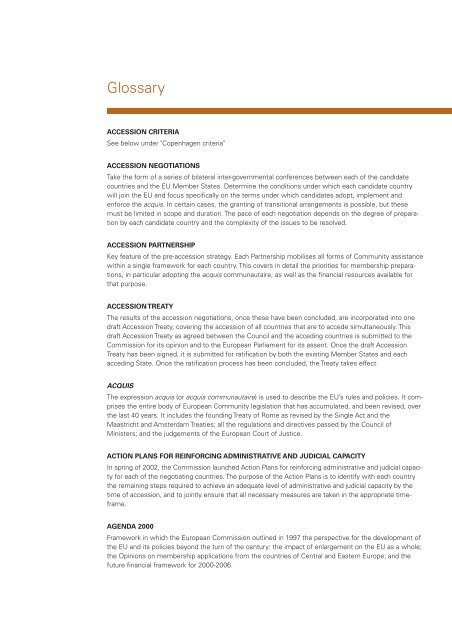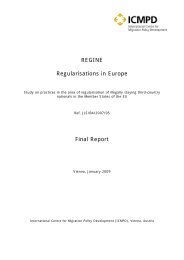European Union Enlargement - An historic opportunity
European Union Enlargement - An historic opportunity
European Union Enlargement - An historic opportunity
Create successful ePaper yourself
Turn your PDF publications into a flip-book with our unique Google optimized e-Paper software.
Glossary<br />
ACCESSION CRITERIA<br />
See below under "Copenhagen criteria"<br />
ACCESSION NEGOTIATIONS<br />
Take the form of a series of bilateral inter-governmental conferences between each of the candidate<br />
countries and the EU Member States. Determine the conditions under which each candidate country<br />
will join the EU and focus specifically on the terms under which candidates adopt, implement and<br />
enforce the acquis. In certain cases, the granting of transitional arrangements is possible, but these<br />
must be limited in scope and duration. The pace of each negotiation depends on the degree of preparation<br />
by each candidate country and the complexity of the issues to be resolved.<br />
ACCESSION PARTNERSHIP<br />
Key feature of the pre-accession strategy. Each Partnership mobilises all forms of Community assistance<br />
within a single framework for each country. This covers in detail the priorities for membership preparations,<br />
in particular adopting the acquis communautaire, as well as the financial resources available for<br />
that purpose.<br />
ACCESSION TREATY<br />
The results of the accession negotiations, once these have been concluded, are incorporated into one<br />
draft Accession Treaty, covering the accession of all countries that are to accede simultaneously. This<br />
draft Accession Treaty as agreed between the Council and the acceding countries is submitted to the<br />
Commission for its opinion and to the <strong>European</strong> Parliament for its assent. Once the draft Accession<br />
Treaty has been signed, it is submitted for ratification by both the existing Member States and each<br />
acceding State. Once the ratification process has been concluded, the Treaty takes effect.<br />
ACQUIS<br />
The expression acquis (or acquis communautaire) is used to describe the EU’s rules and policies. It comprises<br />
the entire body of <strong>European</strong> Community legislation that has accumulated, and been revised, over<br />
the last 40 years. It includes the founding Treaty of Rome as revised by the Single Act and the<br />
Maastricht and Amsterdam Treaties; all the regulations and directives passed by the Council of<br />
Ministers; and the judgements of the <strong>European</strong> Court of Justice.<br />
ACTION PLANS FOR REINFORCING ADMINISTRATIVE AND JUDICIAL CAPACITY<br />
In spring of 2002, the Commission launched Action Plans for reinforcing administrative and judicial capacity<br />
for each of the negotiating countries. The purpose of the Action Plans is to identify with each country<br />
the remaining steps required to achieve an adequate level of administrative and judicial capacity by the<br />
time of accession, and to jointly ensure that all necessary measures are taken in the appropriate timeframe.<br />
AGENDA 2000<br />
Framework in which the <strong>European</strong> Commission outlined in 1997 the perspective for the development of<br />
the EU and its policies beyond the turn of the century: the impact of enlargement on the EU as a whole;<br />
the Opinions on membership applications from the countries of Central and Eastern Europe; and the<br />
future financial framework for 2000-2006.

















